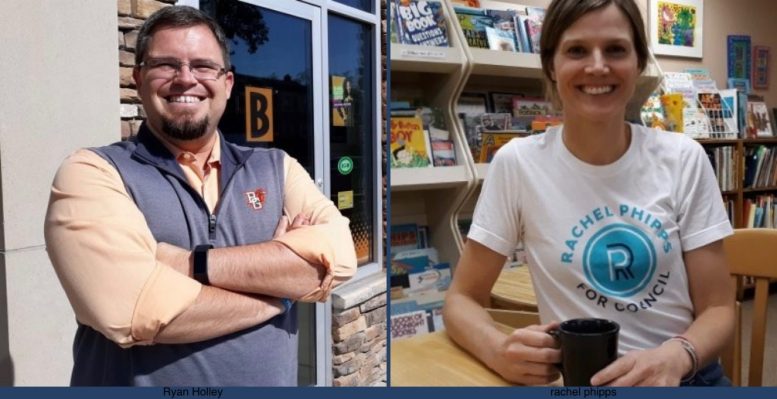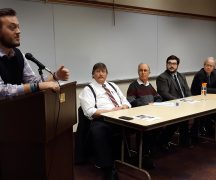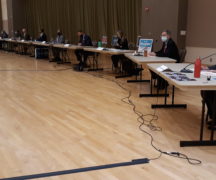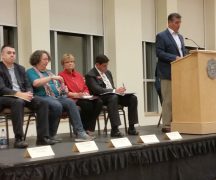By JAN LARSON McLAUGHLIN
BG Independent News
The candidates for Bowling Green City Council’s Third Ward have waged a friendly, neighborly campaign – fitting since they live three doors from each other. When Democrat Rachel Phipps and Republican Ryan Holley found out they were running against each other for the Third Ward seat, they didn’t dig up dirt on each other. They met for coffee.
The Holleys and the Phipps families have children the same age, and run into each other at city parks and playgrounds. Though the candidates differ in their outlooks for Bowling Green, they both represent young families wanting the best for their community.
Holley is a small business owner, a business instructor at Bowling Green State University, and has experience serving with the city’s planning commission, economic development office, and chamber of commerce.
Phipps is an attorney, freelance writer, worked as assistant dean for communications at the UT College of Law, and was an environmental attorney for the Ohio Attorney General’s Office. She recently served on the city’s charter review commission.
Following are the candidates’ reasons for pursuing the seat and their goals if elected.
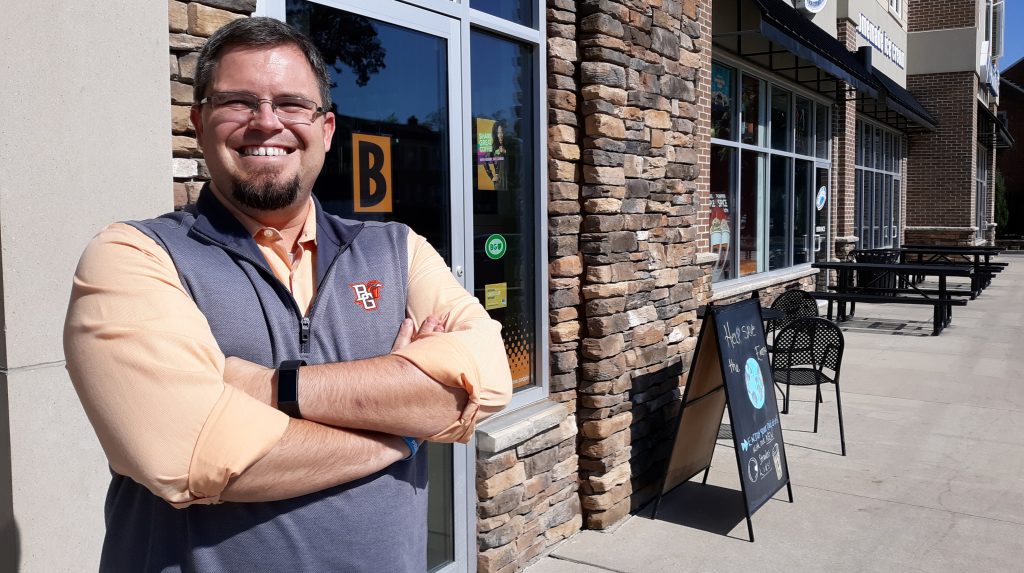
Holley said he first became interested in serving on City Council when he started attending the group’s meetings in 2009 and was named to the city planning commission in 2010.
“I got so frustrated,” he said. “I’ve been wanting to do this since then,” he said. But then babies came along, and work demands were great.
“I love Bowling Green and I think it’s so important to give back,” Holley said. “You can either complain about something, or you can do something about it.”
As someone who owns a small business – the license bureau – and has small children, Holley believes he has a perspective that is needed on city council.
If elected, his top goals would be to make strides in economic development, increase the labor force, improve housing, update zoning and work to implement the city’s master plan.
Holley finds the current zoning codes “so convoluted and confusing.” Changes could help the city develop more affordable housing and could be less restrictive to businesses that want to locate in Bowling Green.
He believes the city has taken important steps in developing a land use plan and master plan.
“We had lots of opportunity for public input,” he said. “City Council has led us to the proper framework – now let’s do it.”
Holley would like to see City Council focus more on the bigger picture of Bowling Green and spend less time on issues that have little impact. He referenced the amount of time spent on setting rules for trash bin placement at homes, and the proposed plastic bag ban.
“Those wasted way too much time,” he said. “You can’t just give the squeaky wheel the oil.”
Holley has a different idea for retail bags – rather than banning single-use plastic bags.
“I don’t think bans work,” he said. “I would like an organization to come together and promote regional bags, like ‘Think BG’ bags – and encourage people to shop local and use those bags.”
As for sustainability issues, Holley supports more green energy in the city, as long as it is affordable to businesses and residents.
“There needs to be a cost benefit,” he said.
And as for community composting, he referred to that as a “dangerous topic.”
“Let’s take a look at it after the sustainability coordinator researches it and makes recommendations.”
With his experience as former manager of the Stadium View Apartments and previous president of the Wood County Apartment Association, Holley brings a different perspective on the city’s consideration of creating a rental registry for housing.
Holley believes property maintenance regulations shouldn’t be limited to rentals. He supports exterior surveys of homes and apartments, and believes that renters should be made aware of inspections available to them from the Bowling Green Fire Division and Wood County Health Department. And homeowners should be made aware of funding available to help with repairs, he said.
Rather than require rental units to meet certain requirements, Holley suggested that a more positive process could be offering incentives to landlords to provide quality housing, then the creation of some type of ranking by the apartment association so renters are aware.
Holley emphasized that his history on city boards has helped prepare him for City Council.
“I’m experienced,” he said. “I’m ready to hit the ground running.”

Phipps believes in public service and in her community.
“I’m running because I see a lot of possibility in Bowling Green,” she said. “It’s a wonderful opportunity to give back.”
Phipps sees opportunities to encourage more redevelopment along East Wooster Street, and to create an even more vibrant downtown.
“Now’s the time to get going on that stuff,” she said of the East Wooster and downtown development plans. “We want downtown to be bustling at all hours of the day.”
Phipps has ideas for sprucing up alleyways with murals, adding sidewalk dining, and rerouting truck traffic around the downtown.
A former environmental attorney, Phipps believes in building on the sustainability programs in the city. That means looking into creating a community composting program, and setting up a sustainability board.
Though the proposed plastic bag ban would have been a “wonderful statement,” Phipps said “there are more effective ways to tackle sustainability.”
Bowling Green can do better, and that includes going beyond being satisfied to just recycle.
“I worry that they are just going to look at recycling as it exists,” she said. “We have this whole waste stream, and just to look at recycling is missing the big picture.”
As for helping to grow Bowling Green’s stagnant population numbers, Phipps believes the upcoming bond issue for a new elementary school would be a big step in the right direction.
“I think it’s critically important. I encourage everyone to vote for it,” she said.
“Young families take that into consideration,” said said of new school buildings when they select a community.
Phipps believes Bowling Green has a lot to offer to new families.
“We just need to tell our story better,” she said. “We need to talk more about the fact that we lead in sustainability,” with 40 percent of the city’s energy coming from renewable sources. That kind of information matters to many young families, she said.
The city could also present a more attractive picture by using citizens on a public arts commission to add more art to the community.
“That’s a low cost investment with a really big return for our community,” she said.
Phipps supports the planning undertaken by the city.
“I think the planning process is important,” she said. “We have some very clear direction – now is the time to get going on it.”
That includes updating zoning rules to allow such changes as high density dwellings in the downtown area.
She commended city officials for their success attracting industry to the outskirts of Bowling Green. But more can be done to grow jobs in emerging sectors and smaller businesses.
Updating the city’s zoning will help.
“It’s the vehicle that’s going to get us where we want to go,” she said. “We need to update and simplify. That makes things predictable for developers and more attractive for the city.”
As for the idea of creating a rental registry that landlords have to comply with, Phipps said perhaps a voluntary registry is the best option.
“More than half of our properties in Bowling Green are rentals. I think we should all agree those properties should be safe.”
But she referred to the city’s Community Action Plan, that suggested a voluntary registry such as one used in Amherst, Massachusetts, which had 100 percent compliance.
“I do think we have to be willing to consider the issue,” she said.

